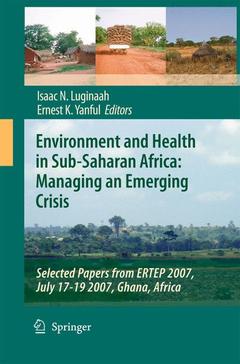Description
Environment and Health in Sub-Saharan Africa: Managing an Emerging Crisis, 2009
Selected Papers from ERTEP 2007, July 17-19 2007, Ghana, Africa
Coordinators: Luginaah Isaac N., Yanful Ernest K.
Language: English
Subjects for Environment and Health in Sub-Saharan Africa: Managing...:
Environment and Health in Sub-Saharan Africa: Managing an Emerging Crisis
Publication date: 11-2014
165 p. · 15.5x23.5 cm · Paperback
Publication date: 11-2014
165 p. · 15.5x23.5 cm · Paperback
Environment and Health in Sub-Saharan Africa: Managing an Emerging Crisis
Publication date: 07-2009
165 p. · 15.5x23.5 cm · Hardback
Publication date: 07-2009
165 p. · 15.5x23.5 cm · Hardback
Description
/li>Contents
/li>Comment
/li>
This book is the second edited compilation of selected, refereed papers submitted to ERTEP 2007. The book is organized into 10 chapters along four of the key themes that were discussed at the conference: Environmental Health Management; Mining and Environment; Environmental Monitoring and Policy Development; and Susta- ability and Social Responsibility. It is hoped that the contents of the book will p- vide an insight into some of the environmental and health management challenges confronting the developing world and the steps being taken to address them. The ?rst three chapters under the Environmental Health and Management theme discusses issues related to food security and related environmental distress in sub- Saharan Africa. Chapter 1 argues that pervasive poverty and low agricultural p- ductivity are important factors in understanding food insecurity in the region, and broader global processes are examined. This chapter maintains that while poverty undermines individual and household access to suf?cient food through market p- chase, land inequalities, corruption, structural adjustment programs, civil con?ict, HIV/AIDS and the role of the World Trade Organization Agreement on Agric- ture are decisive. The authors argue that achieving food security in sub-Saharan Africa requires policies and actions that are integrated with efforts to reduce poverty, enhance livelihoods and incomes and increase agricultural output, while also paying attention to underlying structural factors that bear on agriculture in the region.
Introduction Preface Acknowledgements Section A Environment health and management issues.- 1 Characteristics of the food insecurity situation in Sub-Saharan Africa.- 2 Environment, migration, and food security in the Upper West Region of Ghana.- 3 Integrating food security and agri-environmental quality in Southern Africa: Implications for policy.- Section B Mining and Environment.- 4 Environmental impact of mining and ore processing – a case study at satellite goldfields limited.- 5 Contaminated identities: understanding human and environmental risks and livelihood options among small-scale gold miners in Ghana.- Section C Environmental Management and Policy Development.- 6 Environmental degradation in Sub-Saharan Africa.- 7 Environmental Legislation and Regulation in Sub-Saharan Africa: ‘Green Development’ or ‘Green Imperialism’?.- 8 The impact of industrial clusters in greening manufacturing industry practices: The case of the Old Ardbennie industrial cluster in Harare, Zimbabwe.- Section D Sustainability and Social Responsibility.- 9 Assessing sustainability: The missing elements in current environmental assessment approaches.- 10 Precarious balance: The future of environmental degradation in Sub-Saharan Africa.-Index.
A showcase of environment and health management in developing countries
Exposition of environmental and environmental health challenges that the world’s vulnerable population faces
A review of environmental policies in Sub-Saharan Africa
© 2024 LAVOISIER S.A.S.

